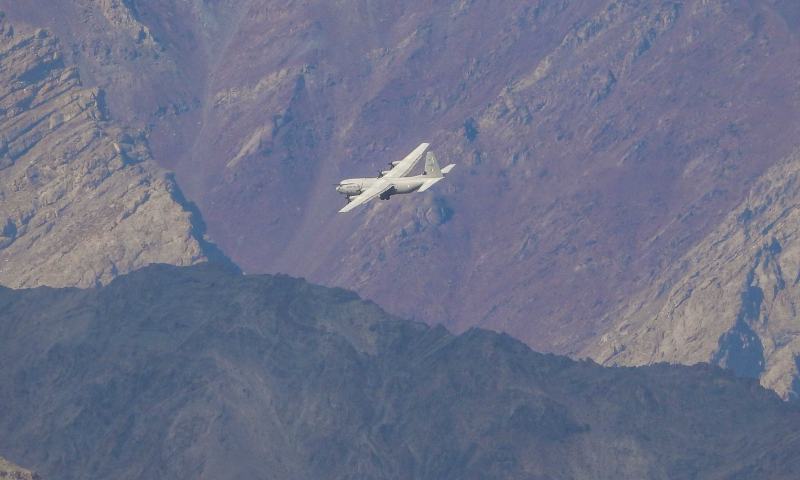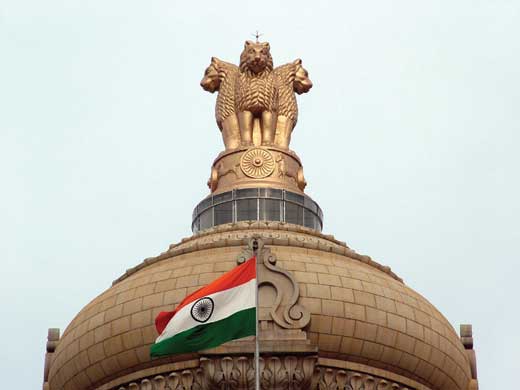
IAF Hercules aircraft carrying military material flies over Ladakh amid border tension with China, in Leh, Friday, Sept. 18, 2020. A PTI Photo
NEW DELHI (PTI): India on Thursday said China should sincerely work with it for complete disengagement of troops from all friction points including the Pangong lake area in Ladakh, as Defence Minister Rajnath Singh asserted no force in the world can stop Indian soldiers from patrolling the country's border in the mountainous region.
Observing it is apparent from China's activities in the border areas their actions are at variance with their words, Singh told the Rajya Sabha the agreement reached by External Affairs Minister S Jaishankar and his Chinese counterpart Wang Yi, if implemented sincerely and faithfully by Beijing, could lead to complete disengagement and restoration of peace and tranquillity in those areas. The Jaishankar-Wang meeting was held in Moscow last Thursday.
At a media briefing, External Affairs Ministry Spokesperson Anurag Srivastava asked China not to make unilateral attempts to change the status quo along the Line of Actual Control(LAC), adding both sides should focus on easing tensions in the friction areas by refraining from any actions that may lead to an escalation in the situation.
There have been at least three attempts by the Chinese People's Liberation Army(PLA) to "intimidate" Indian troops along the northern and southern bank of Pangong lake area in the last three weeks where even shots were fired in the air for the first time at the LAC in 45 years.
"The Chinese side should sincerely work with the Indian side for complete disengagement at the earliest from all friction areas including Pangong Lake as well as de-escalation in border areas in accordance with the bilateral agreements and protocols on maintenance of peace and tranquillity in border areas," Srivastava said. "We hope the Chinese side will strictly respect and observe the Line of Actual Control and not make further attempts to unilaterally change status quo.
The assertion by Srivastava came in the backdrop of remarks by the Chinese foreign ministry on Wednesday that it was for India to initiate the process to disengage and restore peace along the border areas.
In Beijing, Chinese Foreign ministry spokesman Wang Wenbin on Thursday reiterated his country's position.
"The most urgent task is for the Indian side to immediately correct its wrongdoing, disengage from contact on the spot as soon as possible, and take practical actions to promote the easing of the border situation," he said.
Wang was responding to a question at a media briefing as to when the next round of diplomatic and military talks for disengagement will be held following the Jaishankar-Wang meeting.
Making a statement in the Rajya Sabha on the situation in Eastern Ladakh, Rajnath Singh said China has amassed troops on the border and in response India has made appropriate counter deployment.
Singh said there is a mismatch between what China says and does.
"Unki kathani aur karni alag hai (their actions are at variance with their words)."
The border skirmishes and face-off in the last few months with China that led to the killing of 20 Indian soldiers and heavy casualties on the Chinese side in Galwan Valley on June 15 were primarily over the issue of patrolling the Ladakh border.
"No force in the world can stop Indian soldiers from patrolling. Our soldiers have sacrificed their lives only for this," Singh said.
He was responding to a clarification sought by Congress leader and former defence minister A K Antony on reports of Indian forces not being allowed to patrol in certain parts of the Galwan Valley.
"I want to make it clear (that) skirmishes and face-off are because of this (issue of patrolling)," he said, adding the patrolling pattern is traditional and well defined.
Singh made the statement in Upper House after the government and the opposition agreed not to have a discussion on the sensitive issue.
Chairman M Venkaiah Naidu, however, allowed members to seek a few clarifications on the statement, which was almost identical to the one Singh had made in the Lok Sabha on September 15.
Singh also referred to the 5-point agreement reached at the Jaishankar-Wang meeting.
The two sides have reached an agreement, which, if implemented sincerely and faithfully by the Chinese side, could lead to complete disengagement and restoration of peace and tranquillity in the border areas, he said.
The minister said India and China are yet to resolve their boundary question.
"China does not accept the customary and traditional alignment of the boundary between India and China," he said.
"We believe that this alignment is based on well-established geographical principles confirmed by treaties and agreements, as well as historical usage and practice, well-known for centuries to both sides."
The Chinese position, however, is that the boundary between the two countries has not been formally delimited, that there exists a traditional customary line formed by the extent of jurisdiction that they claim was exercised historically by each side, and that the two sides have different interpretations of the position of the traditional customary line," he said.
China, he said, continues to be in illegal occupation of about 38,000 square kilometres of Ladakh. Besides it also holds 5,180 sq km of Indian territory in Pakistan-occupied Kashmir(PoK) that Pakistan had illegally ceded in 1963.
"I would like to mention here that as yet there is no commonly delineated Line of Actual Control (LAC) in the border areas between India and China and there is no common perception of the entire LAC," he said, adding more than two decade old agreements call for two sides to maintain minimal forces along the LAC.
On the latest situation, the minister said India has noticed a build-up of troops and armaments by China in the border areas adjacent to eastern Ladakh since April.
"In early May, the Chinese side had taken action to hinder the normal, traditional patrolling pattern of our troops in the Galwan Valley area, which resulted in a face-off," he said.
Even as this situation was being addressed by the Ground Commanders, in mid-May the Chinese side made several attempts to transgress the LAC in other parts of the Western Sector. This included Kongka La, Gogra and North Bank of Pangong Lake.
"These attempts were detected early and consequently responded to appropriately by our armed forces," he said.
Given the growing friction along the LAC, the senior commanders of the two sides in a meeting on June 6, 2020 agreed on a process of disengagement that involved reciprocal actions.
"Both sides also agreed to respect and abide by the LAC and not undertake any activity to alter the status quo," he said.
"However in violation of this the Chinese side created a violent face off on June 15 at Galwan. Our brave soldiers laid down their lives and also inflicted costs including casualties on the Chinese side," he said.
Indian armed forces have during these provocative actions maintained "sayyam" (restraint) and displayed "shaurya" (valour) to protect the territorial integrity of India, he said.
Giving details of the talks held with China to de-escalate the tension, the minister said India pressed for three key principles -- strictly respecting the LAC, not attempting to alter the status quo unilaterally, and abiding by all agreements and understandings between the two sides.
 Previous Article
Previous Article Next Article
Next Article












The Indian Air Force, in its flight trials evaluation report submitted before the Defence Ministry l..
view articleAn insight into the Medium Multi-Role Combat Aircraft competition...
view articleSky enthusiasts can now spot the International Space Station (ISS) commanded by Indian-American astr..
view article